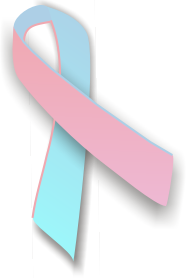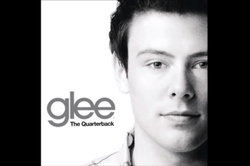 (cc) pink and blue pregnancy loss ribbon by Niki K.
(cc) pink and blue pregnancy loss ribbon by Niki K. Today, October 15th, is Pregnancy and Infant Loss Remembrance Day; October is Pregnancy Loss Awareness Month. However, in the hubbub of Breast Cancer Awareness Month, this other issue that affects at least one in four women does not get much publicity. However, it’s an important day for many who have lost a child. It’s a time to gather and share in the grief of having a child die way too soon. It’s a day to say to the world, “It’s ok for me to miss the child I lost so many years ago even when society says I should be ‘done’ with the pain by now.”
I have experienced both an early miscarriage and a term stillbirth. The summer after my daughter Rebecca died in 1999, I watched a great deal of television as I healed from my physical and emotional pain. When John F. Kennedy, Jr.’s plane disappeared five weeks after her birth and death, I was glued to the non-stop news, not because I was a fan of his, but because I had the tv on as a distraction. As it often does, life forced me to face my pain even when I was trying to ignore it. As the newscasters tried to fill dead air time when there was really no new news to report, they began recounting the many tragic deaths within the Kennedy clan. They spoke of John F. Kennedy and Jackie Kennedy’s son Patrick who was born and died two days later in August 1963. I had previously heard of him, and his death did not bother me at all.
However, what hit home all too closely was when the announcers began discussing the firstborn of JFK and Jackie Kennedy, an unnamed stillborn daughter. This little girl had been largely ignored by history to that point, never named, rarely acknowledged. That was how stillbirths were handled by society in the 20th century until towards the latter years when stillborn babies were finally being acknowledged as beloved children. I cried very painful tears at that point, weeping not for JFK, Jr. but for his forgotten sister and for all the stillborn children of the world whom people had tried to forget rather than facing the deep and horrible pain of their loss. Any time I approach the subject of the Kennedy children, I end up in tears thinking of the little girl whom history tried to forget.
Five years later, I was watching news in the aftermath of the December 26, 2004 tsunami which killed an estimated 230,000 people. One report showed a bereaved mother, holding her young dead son in her arms and keening. As I watched the woman wracked with emotional pain, I thought to myself, “I can’t even imagine what she’s going through.” And then, from nowhere, it hit me. I did know what she was going through. I had held my dead child in my arms, too. There were some big differences in how our losses happened and the age of our children, but I knew all too well what that woman was feeling in that moment. Even though we live half a world away from each other, I have never forgotten this stranger’s face, her pain or loss. That was one of the last times I watched the news for the constantly reported suffering became too much for me to bear.
Much more recently, I was watching “The Quarterback” episode of Glee in which the cast mourns the death of character Finn Hudson whose actor had died from an accidental overdose three months before in July 2013. The episode was poignant and well-done in my opinion. One of the most painful moments for me was listening to Carole Hudson, Finn’s mother, talking about the loss:
How do parents go on when they lose a child? You know, when I would see that stuff on the news, I’d shut it off ‘cause it was just too horrible to think, but I would always think: how do they wake up every day? I mean, how do they breathe, honey? But you do wake up. And for just a second, you forget. And then, oh, you remember. And it’s like getting that call again and again, every time. You don’t get to stop waking up. You have to keep on being a parent, even though you don’t get to have a child anymore.

Losing a child inducts mothers into a “sorority no one wanted to join.” In the US, an estimated 1 in 4 women have experienced miscarriages and approximately 1% of mothers have experienced a stillbirth or neonatal loss. Today, as many of us join together around the nation and the world to remember our losses, we understand each other’s pain all too well. There is no other pain in the world that comes close to the death of a child. It’s no wonder our society wants to try to forget about this horrific part of life.
© 2015 Elizabeth Galen, Ph.D., Green Heart Guidance, LLC
 RSS Feed
RSS Feed